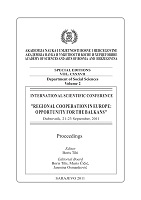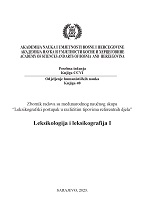RASTOČI SLOVAR SLOVENSKEGA KNJIŽNEGA JEZIKA (ESSKJ) - ORGANIZACIJA IN PRIKAZ JEZIKOVNIH PODATKOV
Author(s): Nataša Gliha Komac,Duša Divjak Race / Language(s): Slovenian
/ Publication Year: 0
Keywords: growing web dictionary; Slovenian; display of linguistic information; dictionary user;
This article presents the third edition of the Dictionary of the Slovenian Standard Language (eSSKJ), i.e. a growing dictionary of the contemporary Slovenian standard language that is produced at the ZRC SAZU, Fran Ramovš Institute of the Slovenian Language since 2016. The dictionary is updated yearly on Fran, the institute‘s dictionary portal. Since September 2021, an adapted school edition of the dictionary has been available on the Franček portal for primary- and secondary-school students. eSSKJ provides semantic information, basic formal and grammatical properties, e.g. orthographic properties, pronunciation and part-of-speech classification. In addition, it also includes information on pragmatic peculiarities of single- and multi-word lexis, typical collocations grouped according to syntactic patterns, full inflectional paradigms (complete with information on dynamic and pitch accents), phraseological units and their variants, etymological highlights and, where relevant, normative explanations and information on word formation. The tagging of data in the dictionary database enables different ways of displaying dictionary content for different users and user needs. Due to the possibilities offered by the web medium, eSSKJ exceeds the classical mode of displaying and accessing linguistic information and provides links to external resources, such as the Dictionary of the Slovenian Sign Language (Slovar slovenskega znakovnega jezika). Each dictionary entry is also equipped with an audio recording of the pronunciation of the headword and its secondary form. The content is displayed on two levels, which are dictated by the portal design. The first level is the list of search results provided to the user when they enter the desired word in the search box. Here, the eSSKJ search results include the basic information on the searched word (e.g. formal properties of the word, breakdown of meanings, set phrases and phraseological units), which, alongside information from other dictionaries (orthographic, historical, dialectal, etc.) provides the user with a comprehensive view of the word from different perspectives. The second level is the display of the entire dictionary entry, which the user gets by selecting the desired dictionary in the list of search results. In the case of eSSKJ, this provides a comprehensive description of the usage of the given word in contemporary Slovenian standard language. Besides usefulness, the dictionary aims for understandability. The latter is pursued through dispensing with abbreviations, which are characteristic of printed dictionaries, a tendency towards explicitly listing information, the addition of explanations in tooltips, the introduction of dictionary metatext to label sections, etc. New solutions in the interpretation of dictionary content can also be found in the school edition of eSSKJ on the Franček portal, which includes more helping hints, explicitly named microstructural elements (e.g. explanation, example, variant), brief explanations of dictionary labels and grammatical categories in tooltips, quick links to appropriate chapters in the school grammar, renamed terms and labels that are harder to understand (e.g. collocations to typical phrases, the label also to less usual in the context of doublets etc.). Students can thus understand the dictionary content more easily but also familiarise themselves with the dictionary structure in general and with the use of different dictionaries.
More...


